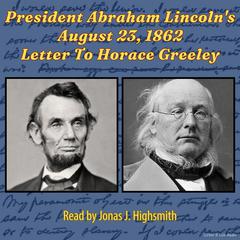 Play Audiobook Sample
Play Audiobook Sample
Abraham Lincoln’s Second Inaugural Address Audiobook
 Play Audiobook Sample
Play Audiobook Sample
Quick Stats About this Audiobook
Total Audiobook Chapters:
Longest Chapter Length:
Shortest Chapter Length:
Average Chapter Length:
Audiobooks by this Author:
Publisher Description
Abraham Lincoln delivered his second inaugural address on March 4, 1865, during his second inauguration as president of the United States. At a time when victory over the secessionists in the American Civil War was within days and slavery was near an end, Lincoln spoke of sadness. A mere 703 words, Lincoln's speech did not offer the North a victory speech, nor did he excoriate the South for the sin of slavery. Instead, he called on the entire country's guilt for the bloody war and argued for reconciliation and unity. Considered one of his greatest speeches, the address is inscribed, along with the Gettysburg Address, in the Lincoln Memorial.
Proceeds from sale of this title go to Reach Out and Read, an innovative literacy advocacy organization.
Download and start listening now!
Abraham Lincoln’s Second Inaugural Address Listener Reviews
Be the first to write a review about this audiobook!
About Abraham Lincoln
Abraham Lincoln (1809–1865) was the sixteenth president of the United States, serving from March 1861 until his assassination in April 1865. He led the US through its greatest constitutional, military, and moral crises—the American Civil War—preserving the Union, abolishing slavery, strengthening the national government, and modernizing the economy. Reared in a poor family in rural Indiana, he was a self-educated man. In the 1830s he became a country lawyer, a Whig Party leader, and Illinois state legislator. He later served as a one-term member of the House of Representatives during the 1840s.
About Dion Graham
Dion Graham is an award-winning narrator named a “Golden Voice” by AudioFile magazine. He has been a recipient of the prestigious Audie Award numerous times, as well as Earphones Awards, the Publishers Weekly Listen Up Awards, IBPA Ben Franklin Awards, and the ALA Odyssey Award. He was nominated in 2015 for a Voice Arts Award for Outstanding Narration. He is also a critically acclaimed actor who has performed on Broadway, off Broadway, internationally, in films, and in several hit television series. He is a graduate of Rutgers University’s Mason Gross School of the Arts, with an MFA degree in acting.







































